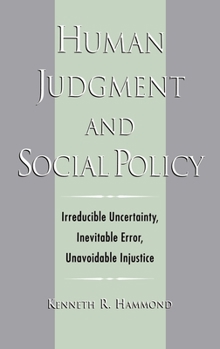Human Judgment and Social Policy
Select Format
Select Condition 
Book Overview
From the O.J. Simpson verdict to peace-making in the Balkans, the critical role of human judgement--complete with its failures, flaws, and successes--has never been more hotly debated and analyzed than it is today. This landmark work examines the dynamics of judgement and its impact on events that take place in human society, which require the direction and control of social policy. Research on social policy typically focuses on content. This book concentrates instead on the decision-making process itself. Drawing on 50 years of empirical research in decision theory, Hammond examines the possibilities for wisdom and cognitive competence in the formation of social policies, and applies these lessons to specific examples, such as the space shuttle Challenger disaster and the health care debate. Uncertainly, he tells us, can seldom be fully eliminated; thus error is inevitable, and injustice for some unavoidable. But the capacity for make wise judgments increases to the extent that we understand the potential pitfalls and their origin. The judgment process for example involves an ongoing rivalry between intuition and analysis, accuracy and rationality. The source of this tension requires an examination of the evolutionary roots of human judgement and how these fundamental features may be changing as our civilization increasingly becomes an information and knowledge-based society. With numerous examples from law, medicine, engineering, and economics, the author dramatizes the importance of judgment and its role in the formation of social policies which affect us all, and issues the first comprehensive examination of its underlying dynamics.
Format:Hardcover
Language:English
ISBN:0195097343
ISBN13:9780195097344
Release Date:September 1996
Publisher:Oxford University Press
Length:448 Pages
Weight:1.70 lbs.
Dimensions:1.4" x 6.4" x 9.5"
Customer Reviews
1 rating
Actual policy making is both risky and very uncertain
Published by Thriftbooks.com User , 20 years ago
Hammond does a brilliant job of showing how the uncertainty (the information set upon which decisions will be evaluated and choices made is at all times partial in nature and can never be complete)of the available information available to government and public policy administrators very often offers a cogent explanation for the constant mistakes and failures of expert opinion throughout history.For example,his discussion of Irving Fisher(the leading American economic expert from 1910-1929)and,from retrospect,his incredible misjudgment of the state of both the world and American economy in late October,1929,is shown to be commonplace.The experts are experts,but they are also unduly overconfident and overoptimistic about the range of application of their limited knowledge base in a world that is inherently uncertain.Much of what Hammond's says has ,in a more general framework,been said and emphasized by John Maynard Keynes.Joseph Schumpeter also made the same points,but underestimated the dangers of such uncertainty to any kind of decision maker,private or public.Hammond offers some suggestions about ways in which policy makers can have a better chance of succeeding in their goals.Administrative coordination and the avoidance of making crucial decisions at a time of undue stress or pressure are mentioned and discussed.One writer who is missing from Hammond's references and has a valuable understanding of the turbulence of markets and the fact that the unexpected,unexpected that is by conventional economist models,occurs all too often,is Benoit Mandelbrot.Perhaps his work could be integrated in a future edition by Hammond within his framework of irreducible uncertainty.






